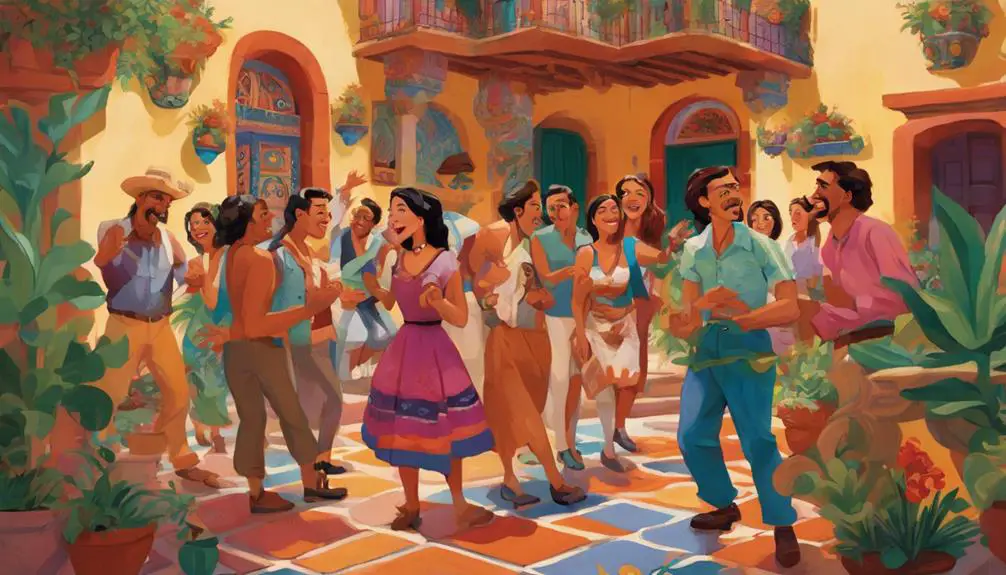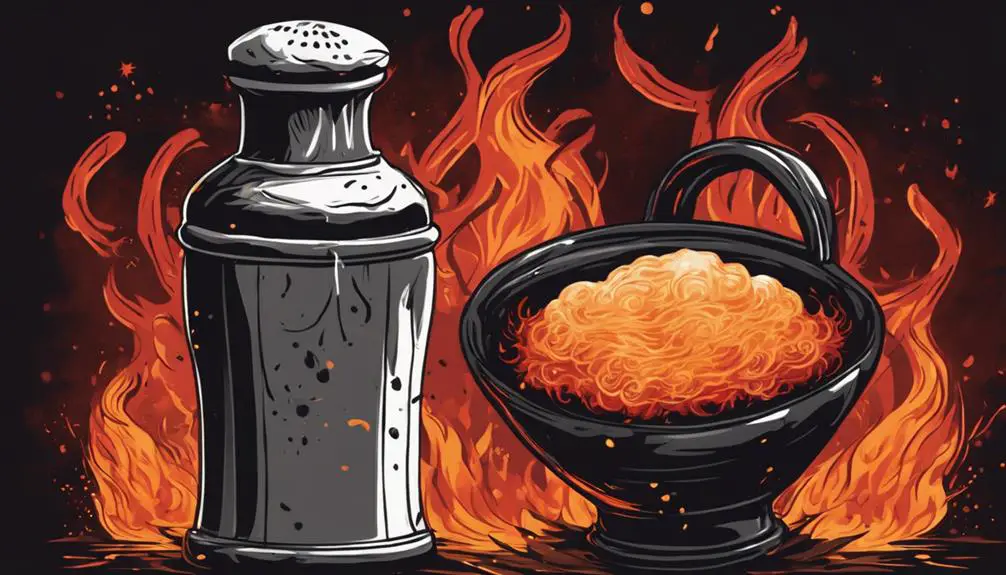You're about to immerse yourself in the vibrant world of Spanish slang, where drama isn't just a concept, but a way of life. From telenovelas' over-the-top plot twists to masterfully crafted insults, Latin American culture is steeped in drama. You'll discover how to spice up everyday conversations with vivid expressions, navigate social hierarchies through chismeando, and even master the art of walk-out strategies. With phrases like 'Estoy hasta la madre!' and 'Eso es la gota que colma el vaso!', you'll be adding drama and flair to your words in no time. As you explore this world, the drama will only intensify – and you'll find yourself drawn deeper into its rhythm.
Telenovelas: The Ultimate Drama Fix

You immerse yourself in a night of guilty pleasure TV, and suddenly you're hooked on the over-the-top plot twists, melodramatic music, and passionate love triangles of Latin America's favorite export: telenovelas. These addictive soap operas have captivated audiences worldwide with their dramatic storylines, larger-than-life characters, and, of course, Latin passion. You can't help but get drawn into the intricate web of family secrets, hidden agendas, and forbidden loves that fuel the drama.
Telenovelas are more than just mindless entertainment; they're a reflection of Latin American culture, with its rich history, vibrant traditions, and complex social dynamics.
As you explore further into the world of telenovelas, you'll discover the nuances of Latin American society, from the importance of family ties to the struggle for social justice. With each episode, you'll be treated to a masterclass in dramatic storytelling, complete with cliffhangers, plot twists, and heart-stopping revelations.
Slanging Insults With Tiraeras
As you navigate the dramatic world of telenovelas, you're likely to encounter a cast of fiery characters trading clever insults, known as tiraderas, which are an integral part of Latin American slang and a hallmark of Spanish-language TV drama.
Tiraderas are more than just insults – they're a form of verbal sparring that requires skill, creativity, and quick thinking. In the world of telenovelas, characters engage in verbal battles, exchanging witty one-liners and clever put-downs that leave their opponents reeling.
Mastering the art of tiraderas is an essential part of insult artistry in Spanish-language TV drama. Characters must be able to think on their feet, crafting clever insults that are both biting and humorous. It's a delicate balance between being clever and being cruel, and the best tiraderas walk this line with ease.
As you watch these verbal sparring matches unfold, you'll gain a deeper appreciation for the linguistic dexterity and cultural nuances that make Latin American slang so rich and vibrant.
Dramatic Expressions for Everyday Life

In the midst of daily interactions, Latin Americans often inject a dash of drama into their conversations, peppering their speech with vivid expressions that add flavor and flair to even the most mundane exchanges.
You'll find that everyday conversations are often punctuated with dramatic expressions that add a touch of flair to otherwise ordinary moments. For instance, when describing a minor setback, you might exclaim '¡Esto es un drama!' (This is a drama!) or '¡Es una tragedia!' (It's a tragedy!).
These emotional outbursts, though seemingly over-the-top, are an integral part of Latin American communication. By incorporating life theatrics into daily conversations, you're not only adding flavor to your speech but also showcasing your emotional range.
Melodramatic moments, far from being seen as excessive, are an authentic expression of Latin American culture. So, the next time you're describing a frustrating experience, don't be afraid to throw in a dramatic flourish – it's all part of the daily drama that makes Latin American conversations so vibrant and engaging.
Latin American Drama Hotspots
From the vibrant streets of Buenos Aires to the bustling markets of Mexico City, Latin America is home to a plethora of drama hotspots where the lines between reality and theatricality blur.
You'll find yourself swept up in a Fiesta Frenzy, where the rhythm of salsa and merengue pulses through the air, and the drama unfolds like a telenovela. In these urban hubs, the streets are the stage, and everyday life becomes a performance.
You'll witness impassioned arguments, dramatic entrances, and over-the-top reactions – all part of the Urban Turf where locals live, breathe, and thrive on drama.
In these hotspots, you'll discover that drama isn't just a form of entertainment, but a way of life. Where else can you find people who can turn a simple conversation into a dramatic monologue, or a casual encounter into a full-blown spectacle?
In Latin America, drama is woven into the fabric of daily life, and you're invited to join the show.
The Art of Chismeando

What's the secret to mastering the art of chismeando, where gossip and chatter blend seamlessly with witty remarks and clever comebacks, and you find yourself effortlessly maneuvering the intricate web of social relationships in Latin American cultures?
As you navigate the complex world of chisme dynamics, you'll realize that gossip culture isn't just about spreading rumors, but about establishing social hierarchies and negotiating relationships.
You'll learn to distinguish between harmless chisme and malicious gossip, and understand how to use witty remarks to deflect or redirect unwanted attention. Chismeando is an art that requires finesse, tact, and a deep understanding of the unspoken rules that govern social interactions in Latin American cultures.
As you hone your skills, you'll become adept at reading between the lines, recognizing subtle cues, and adapting your tone to fit each conversation.
You'll develop a keen sense of timing, knowing when to drop a clever comeback or a well-timed joke to defuse tension or shift the conversation. By mastering the art of chismeando, you'll not only navigate the complexities of Latin American social dynamics but also earn the respect and admiration of those around you.
From Rage to Drama in 5 Seconds
You've likely witnessed it: a casual conversation suddenly escalating into a heated debate, with voices raised and emotions running high, as if a switch had been activated from calm to crisis mode.
One minute you're chatting with your amigo about the latest fútbol game, and the next, you're both standing nose-to-nose, defending your teams' honor. This rapid emotional escalation is a hallmark of Spanish drama, where rage triggers can be as innocuous as a misplaced comma or a differing opinion on the best tapas dish.
In this high-stakes game of emotional poker, one misstep can lead to a full-blown drama fest. A careless comment can spark a firestorm of defensiveness, with each participant upping the ante until the situation reaches a boiling point.
It's as if the air is charged with electricity, waiting for the perfect storm of triggers to set off a torrent of passion and fury. In this world of Spanish slang, mastering the art of drama requires a deep understanding of these emotional tripwires, as well as the linguistic agility to navigate the treacherous waters of rage and reconciliation.
Slang for When You're Salty

When you find yourself seething with resentment after a heated debate, Spanish slang has got you covered with a range of salty expressions to vent your frustrations.
You're not just angry, you're 'saliendo del coco' (losing your cool) and it's time to let it all out.
In Spain, when you're feeling salty, you're said to have 'mala leche' (bad milk), implying a sour attitude.
If someone's being a drama queen, you can call them out for being 'dramática' (dramatic) or 'teatral' (theatrical).
But if you're the one feeling salty, you might say 'me ha salido el tigre' (the tiger has come out in me), implying your inner beast is released.
When the conversation gets too heated, you might accuse someone of being 'mala persona' (a bad person) or 'mal rollo' (bad vibes).
Remember, in Spanish slang, being salty isn't just about being angry – it's about embracing the drama and owning those salty vibes.
Dramatic Ways to End a Fight
As the argument reaches its boiling point, you can employ some dramatic flair to bring the fight to a close, like slamming the door and declaring 'me voy' (I'm out of here), effectively ending the discussion. This walk-out strategy is a classic move in Spanish-speaking cultures, where a dramatic exit can be a powerful way to land a final blow and assert your independence.
When you're fed up with the argument, you can say 'hasta luego' (see you later) and make a swift exit, leaving the other person to stew in their own frustration. Another option is to declare 'ya está' (that's it), implying that you've had enough and won't engage further.
These phrases and walk-out strategies can be potent tools in your arsenal of dramatic ways to end a fight, allowing you to maintain your dignity and assert your boundaries. By mastering these final blows, you'll be well-equipped to bring even the most heated arguments to a close.
Bringing the Drama With Modismos

In the heat of an argument, modismos – colorful, idiomatic expressions – can be your secret weapon to add drama and emphasis to your words, allowing you to express frustration, annoyance, or exasperation with flair and authenticity. You'll sound like a native Drama Queen, effortlessly throwing shade with phrases like '¡Estoy hasta la madre!' (I'm fed up!) or '¡Eso es la gota que colma el vaso!' (That's the last straw!).
As you master these modismos, you'll notice how they evolve with slang, adapting to the cultural and social context of the Spanish-speaking world. This slang evolution is a dynamic process, reflecting the creativity and diversity of Latinx communities. By embracing modismos, you'll not only add drama to your conversations but also tap into the rich cultural heritage of Spanish-speaking countries.
Frequently Asked Questions
What's the Difference Between "Drama" and "Escándalo" in Spanish Slang?
You're wondering about the difference between 'drama' and 'escándalo' in Spanish slang. Let's break it down.
While both terms convey a sense of controversy, 'drama' implies a more personal, emotional conflict, often with nuances of gossip or attention-seeking.
On the other hand, 'escándalo' carries stronger connotations of public outrage, scandal, or moral outrage.
How Do I Respond to Someone Who's "Troleando" Me?
'When life gives you lemons, make lemonade' – that's exactly what you should do when someone's 'troleando' you. Don't take the bait! Respond with calm responses, avoiding getting drawn into a heated argument.
But if you want to throw some shade, a witty, sassy comeback can be effective. Just remember to keep it light and playful, without escalating the situation.
You got this!
Can I Use "Chisme" and "Chismoso" Interchangeably?
When understanding gossip culture, you're wise to grasp the nuances of 'chisme' and 'chismoso'. While both terms relate to gossip, they're not interchangeable.
'Chisme' specifically refers to the act of gossiping or the juicy information being shared.
On the other hand, 'chismoso' describes someone who frequently engages in gossip or spreads rumors.
As you navigate social norms, using these terms correctly will help you avoid unintentionally perpetuating gossip culture.
What's the Origin of the Phrase "Mandar Frutas" in Latin American Slang?
As you explore the vibrant world of Latin American slang, you'll discover the fruitful expression 'mandar frutas.'
This phrase, meaning 'to send fruits,' is rooted in cultural significance, symbolizing abundance and prosperity.
In many Latin American countries, fruits are a symbol of good fortune, and 'mandar frutas' implies sharing success with others.
It's an idiomatic expression that transcends literal meaning, conveying a sense of generosity and community.
Are "Tiraera" and "Piropo" Mutually Exclusive in Flirting?
You're curious about the flirtatious dance between 'tiraera' and 'piropo'.
Essentially, they're not mutually exclusive. 'Tiraera' refers to romantic insults, a playful way to test someone's interest, while 'piropo' is a charming compliment.
Think of it as a flirtatious push-and-pull. You might toss a lighthearted jab (tiraera), and then quickly follow up with a sincere praise (piropo).
This playful teasing can be an artful way to build attraction and intimacy.
Conclusion
As you've explored the dramatic landscape of Spanish slang, you've become a master of releasing shade, dodging tiraeras, and serving up sass.
Your vocabulary's on fleek, your expressions are fire, and your chismeando skills are unmatched.
You're a force to be reckoned with, a whirlwind of drama and wit, leaving a trail of linguistic magic in your wake.
So go ahead, set free your inner drama queen, and let the Spanish slang drama unfold.







